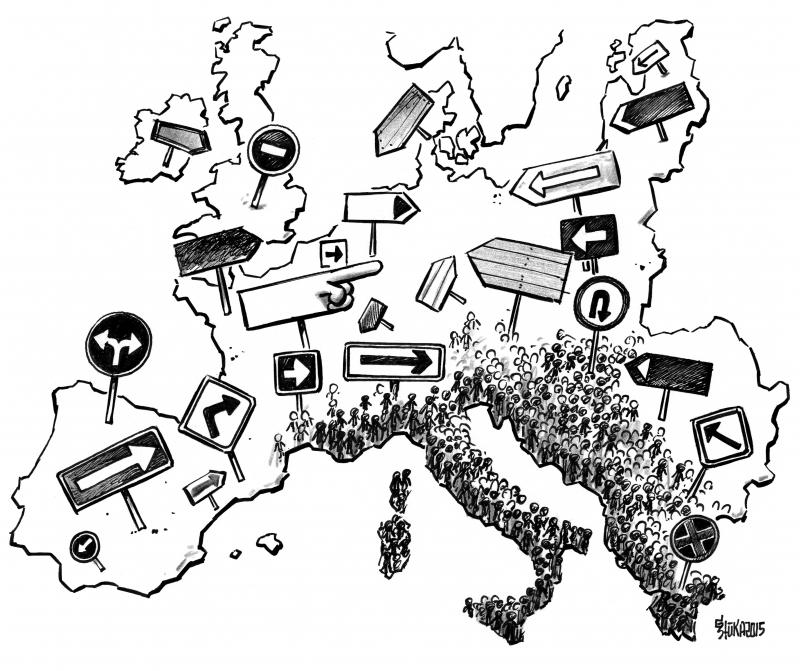Voilà plusieurs mois que la Finlande traverse une crise. En novembre 2023, le pays nordique a décidé de fermer sa frontière avec la Russie suite à l’augmentation des entrées de demandeurs d’asile sur son territoire. Pour Helsinki, aucun doute : les traversées – plus d’un millier entre août et décembre de la même année – ont été orchestrées par le Kremlin, en représailles de son adhésion à l’OTAN en avril dernier. Depuis, les portes du pays demeurent fermées, et les entrées irrégulières se font rares. C’est pour contrer d’autres éventuelles pressions que la Finlande souhaite se doter d’une nouvelle législation anti-migration.
Le projet de loi d’urgence est surnommé “loi sur le refoulement”. Le texte, très discuté, prévoit entre autres d’autoriser le refoulement des migrants à la frontière sans possibilité de déposer une demande de protection internationale. Maintes fois retardé, le texte doit être voté par le Parlement en juillet – mais son contenu pourrait encore être modifié.
La loi, pensée comme une mesure d’urgence, ne serait applicable que pour une durée limitée et seulement en cas de circonstances exceptionnelles – c'est à dire, si l’’instrumentalisation des personnes migrantes peut être prouvée.
Un texte élaboré, donc, pour lutter contre l’influence de la Russie, dans l’éventualité où celle-ci reprendrait ses opérations de déstabilisation. Reste que le projet de loi est critiqué par des ONG, certaines institutions européennes, plusieurs juristes finlandais et de nombreux experts. En cause, le non-respect des droits fondamentaux qu'impliqueraient ces refoulements, qui entreraient également en conflit avec plusieurs textes internationaux ainsi qu’avec la Constitution finlandaise. La pression que la nouvelle loi ferait peser sur les garde-frontières a également fait l’objet de critiques.
Mais la majorité de la population finlandaise, elle, la considère indispensable pour garantir la sécurité du pays face à son voisin russe, comme l’indique un sondage du service d’information Uutissuomalainen, ici repris par Helmi Henell dans Iltalehti. “62 % des Finlandais soutiennent la loi, 17 % y sont opposés et 21 % ne peuvent se prononcer. Les hommes sont plus favorables à la loi que les femmes, et les personnes âgées y sont plus favorables que les jeunes”, résume le tabloïd. Des résultats qui viennent conforter la position des partisans de la nouvelle législation.
Dispute politique
Dans le sillage du projet de loi a suivi une bataille politique : le texte, qui nécessite un vote à la majorité des cinq sixièmes, place les députés du Parti social-démocrate de Finlande (SDP, centre gauche) dans une position délicate. Actuellement dans l’opposition,
divisés eux-mêmes sur la loi, les voilà pourtant sommés de suivre la majorité parlementaire pour atteindre le nombre de voix nécessaires. Inquiets de l’impact que pourrait avoir la loi sur le refoulement, les sociaux-démocrates ont demandé à plusieurs reprises de réexaminer et de modifier le texte, sans quoi ils refuseraient de voter en sa faveur.
“Les informations sur la situation actuelle et celle de l'automne [2023] montrent qu'il n'y a pas lieu d'adopter une telle loi, qui est en violation flagrante de la Constitution, du droit international et des conventions relatives aux droits humains”, a expliqué la vice-présidente du SDP Nasima Razmyar lors d’un entretien avec Erno Laisi pour Ilta Sanomat. Avant de continuer : “Nous devrions être particulièrement convaincus de la nature et de l'étendue de la menace et du caractère totalement inopérant des autres options pour promulguer une telle loi.”
Prudence vis-à-vis du manque d’information, volonté de ne pas céder à la pression russe, inquiétudes quant au respect des droits humains et des conventions internationales placent les sociaux-démocrates finlandais face à un dilemme. Faut-il voter pour le refoulement de migrants ou tenir la position – quitte à prolonger, in fine, la fermeture de la frontière ? Au gouvernement, la deuxième option est vue comme difficilement soutenable, alors que plane la menace d’une nouvelle opération russe, comme le décrypte Iida Hallikainen, toujours pour le Ilta Sanomat.
Les gagnants et les perdants
Dans un article exhaustif pour Novaya Gazeta Europe, Andrey Smolyakov rappelle que les raisons qui ont mené à la situation d’aujourd’hui sont multiples. “Le nouveau projet de loi et l'éventuelle ouverture des frontières avec la Russie se sont avérés être le point d'intersection de plusieurs processus dans la politique finlandaise”, analyse-t-il. “Il est facile de voir l'agenda du nouveau gouvernement de droite et du Parti des Finlandais (PS, extrême droite) dans l'adoption de cette loi. Même si elle est temporaire, cette loi s'inscrit parfaitement dans le nouveau paradigme de l'immigration, et les autres initiatives ne se démarquent pas tellement dans ce contexte.”
Pour Smolyakov non plus, une fermeture totale des frontières ne peut pas durer. Selon lui, le gouvernement finlandais verrait donc dans la loi sur le refoulement une solution pragmatique, quoique controversée, à un problème bien réel. “Et pour les réfugiés, il s'agit probablement de la pire option possible, même si on la compare aux mesures plus sévères que jamais que le gouvernement est en train d'élaborer”, conclut-il. En effet, le gouvernement entend également durcir l’accès à la protection internationale et à la citoyenneté finlandaise par d’autres réformes.
“Le projet de loi sur la sécurité des frontières proposé par le gouvernement constitue un précédent qui pourrait avoir des conséquences importantes pour l'Etat de droit en Finlande”, s’inquiète pour sa part le Helsingin Sanomat dans un éditorial. “Le terrain est maintenant préparé pour qu'un autre gouvernement, dans une autre situation, puisse facilement violer la Constitution et les accords internationaux.”
Pour le quotidien, le projet de loi ne résoudra pas le problème. “La Russie peut toujours autoriser les migrants à franchir la frontière, et des personnes peuvent très bien traverser la longue frontière terrestre de la Finlande sans être détectées ou appréhendées”. Et de conclure avec amertume : “Il existe un conflit ouvert entre la sécurité nationale et l'Etat de droit. Pour le gouvernement, c’est l'Etat de droit qui doit perdre.”
Le débat autour de la loi pour le refoulement s’inscrit dans un contexte géostratégique particulièrement difficile où s'enchaînent mouvements de troupes russes à la frontière et multiplication des actions de déstabilisation, rendant d’autant plus inaudible les inquiétudes quant au respect des droits humains ou de l’Etat de droit. Dans pareille situation, la Finlande fait ce qu’elle espère être le choix de la sécurité – le prix à payer risque d’être élevé.
Mis à jour le 3 juillet 2024
En partenariat avec Display Europe, cofinancé par l'Union européenne. Les points de vue et opinions exprimés n'engagent cependant que leur(s) auteur(s) et ne reflètent pas nécessairement ceux de l'Union européenne ou de la Direction générale des réseaux de communication, du contenu et de la technologie. Ni l'Union européenne ni l'autorité subventionnaire ne peuvent en être tenues pour responsables.

Do you like our work?
Help multilingual European journalism to thrive, without ads or paywalls. Your one-off or regular support will keep our newsroom independent. Thank you!












